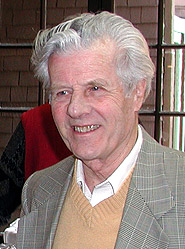Berkeleyan
Obituary
Eugene E. Petersen
![]()
09 November 2005
 Eugene Petersen |
Petersen, a leader in the field of reaction engineering, devoted his career to understanding the key unit of a chemical plant, the chemical reactor, where reactants are transformed into useful products. Through his development of pioneering theories and experiments, he helped transform a field that had been based on observation and experience to one of analytical principles.
Born and raised in Tacoma, Wash., Petersen spent 1941 as a pre-engineering student at the University of Puget Sound. He then worked as a tool-and-die-making apprentice before joining the Army, where he served three years (1943-46). After completing his military service, he went back to college, receiving his B.S. (1949) and M.S. (1950) degrees in chemical engineering from the University of Washington, followed by a Ph.D. in fuel science from Pennsylvania State University in 1953.
Petersen joined the Division of Chemical Engineering (later to become the department) as an instructor in 1953 and steadily climbed the academic ladder, being appointed a full professor in 1965.
He had a longstanding interest in determining why catalysts failed and how that failure affected the active material. To further his understanding, he developed the Single-Pellet Reactor, an instrument that allows a definitive analysis of chemical, diffusional, and poisoning phenomena in catalysis. This device was designed in an elegant and straightforward manner, with specific gradients that can be measured to provide information on catalytic reaction and deactivation pathways. This apparatus assisted chemical engineers in explaining the relationship between kinetics and mass transfer within catalyst pellets.
Petersen also developed a powerful theoretical model for predicting catalyst performance over its lifetime, and produced Monte-Carlo simulations of transport and chemical reaction within porous catalysts. Additionally, he was well known for developing the first detailed model of the operation of a fluid-bed reactor and its catalyst regenerator, an important petroleum-refining operation.
Petersen was recognized for his contributions to chemical engineering with the 1985 R. H. Wilhem Award in Chemical Reaction Engineering from the American Institute of Chemical Engineers for his unique contributions to the theory and experimental elucidation of catalyst deactivation phenomena. He gave many invited lectures, including the prestigious Reilly Lectures at Notre Dame University, and had more than 90 publications, including three well-received books. His 1965 milestone textbook, Chemical Reaction Analysis, taught generations of students the sophistications inherent in catalytic reaction engineering.
Within the department, Petersen was recognized as a clear and incisive teacher. He received praise from his students for his encouragement of class discussion and creative thinking, his positive attitude toward students, and his willingness to spend time addressing their questions out of class. Over his 38 years on the faculty, he mentored 28 master's students and 27 doctoral students, many of whom went on to have illustrious careers in academia and industry.
Petersen retired in 1991, though he continued to perform research and attend numerous alumni events, staying connected with the college and his former students. He had many interests, including horticulture, poetry, and piano.
A resident of Lafayette, Petersen is survived by his wife of 57 years, Kathryn Dorothy Petersen; a son, Richard; a daughter, Renee Keller; and several grandchildren. A memorial service was held Wednesday, Nov. 9, at the Faculty Club, Contributions for scholarships in his memory may be made to the Department of Chemical Engineering, 201 Gilman Hall, University of California, Berkeley, CA 94720-1462.
- Yvette Subramanian

